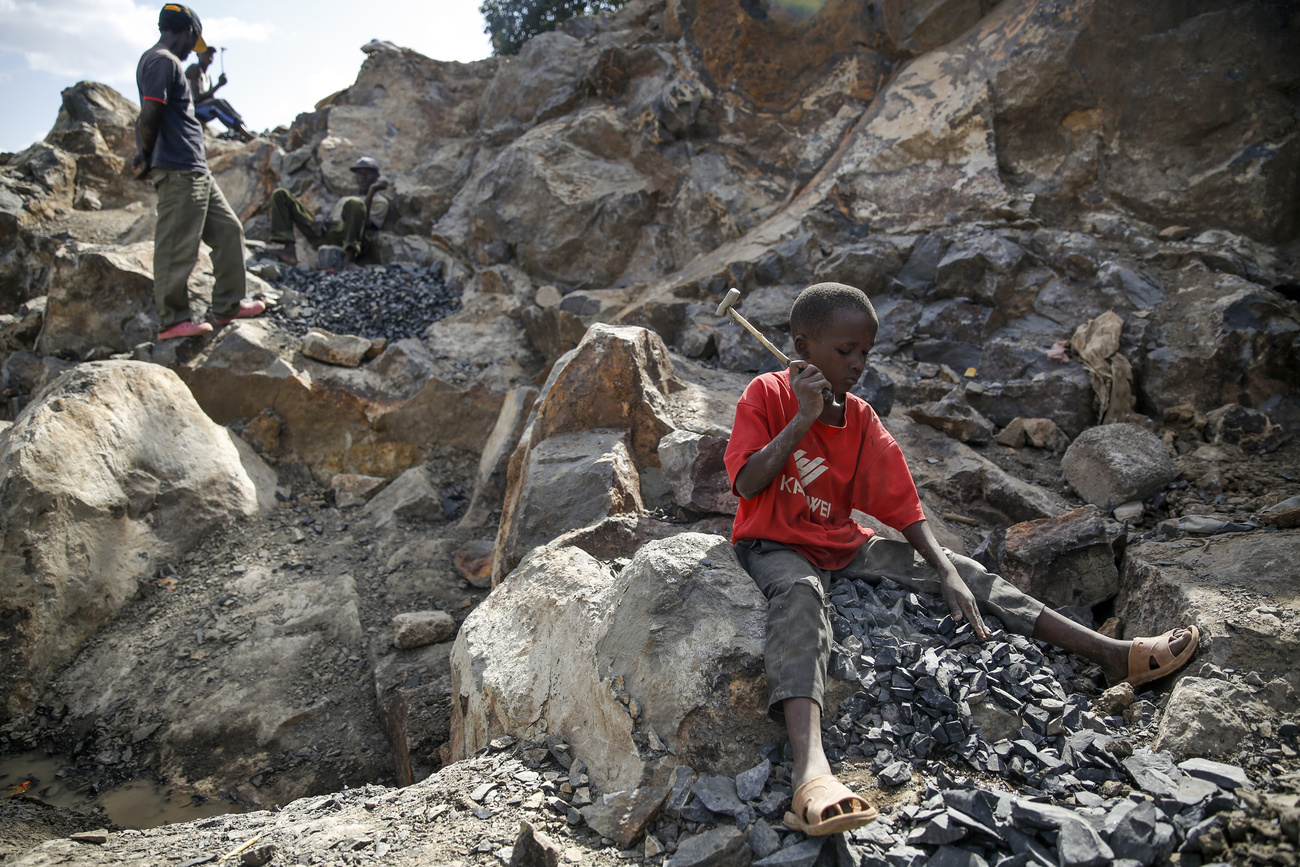
Better latte than never: Swiss coffee industry joins forces to improve conditions of coffee growers

A heterogenous alliance of Swiss traders, roasters, cafés, bureaucrats, academia and NGOs is trying to raise the sustainability bar across the entire industry.
Little Switzerland is a coffee Goliath. The more than 40 members of the Swiss Coffee Trade Association (STCA) are responsible for more than half of all green coffee (non-roasted beans) bought and sold worldwide. Switzerland is also the top exporter by value of roasted coffee beans (worth over CHF3 billion or $3.4 billion in 2023) largely thanks to Nestlé that roasts all its coffee here.
But there are clouds on the horizon that challenge Switzerland’s role as a market leader. The Swiss coffee industry has to align with stricter sourcing regulations imposed by the EU as well as struggling small producers that are failing to make a living from coffee.
In a bid to ensure more sustainable supply chains, the Swiss Sustainable Coffee Platform (SSCP) External linkwas launched today. Supported by the Swiss government, it aims to bring the private sector, non-profits, academia and the government on the same page when it comes to the issue of sustainable coffee.
The initiative comes as the industry is facing pressure from the European Union, which introduced a “zero deforestation” supply chain regulationExternal link. It’s planned to come into force in January 2025. Seven agricultural commodities, including coffee, cannot be sold in the EU unless it can be proven that they have not caused deforestation since 2020. The EU accounted for 44% of Swiss roasted coffee exports last year.

More
Your favourite coffee was probably made by a Swiss machine
Another problematic issue for the industry is guaranteeing farmers a living income from what is supposed to be a cash crop. Findings of a report published in 2023 by the Global Coffee PlatformExternal link showed that small coffee growers in Brazil – the world’s top producer – are struggling to make ends meet. Those with plantations smaller than five hectares could not obtain a living income from coffee alone. According to Procafé, the Swiss association for the promotion of coffee, about 70% of the world’s coffee is grown by 25 million small farmers and the Swiss coffee industry is relying on them to stick to coffee cultivation to guarantee sufficient supplies of a high and consistent quality and avoid volatility in coffee prices.
“While a company can refine its coffee sourcing policies, addressing systemic issues such as poverty in developing countries is far more intricate. Simply paying more for coffee doesn’t resolve these challenges, as poverty is a multifaceted problem with deep-rooted causes in economic inequality, lack of education, inadequate healthcare, political instability, and environmental degradation,” says Krisztina Szalai, Secretary General of the Swiss Coffee Trade Association and Chairwoman of the umbrella organisation Community of Interest (CI) Coffee Switzerland.
Collective action
Some of the big players like Nestlé have been working on environment and labour issues for a couple of decades in partnership with the certifying body Rainforest Alliance. The Swiss multinational has committed to responsibly source all its coffee by 2025 (it was at 92.8% in 2023).
However, there has been no industry-wide joint effort to tackle environmental, labour and living wage challenges in a way that reflects the strengths and needs of the Swiss coffee industry – until now.
“Sustainability in coffee cannot be defined by a single metric or solely measured by certified volumes in supply chains. It encompasses a broad range of factors, including environmental stewardship, social equity, economic viability, and the well-being of coffee farmers and their communities,” says Szalai.

More
Subscribe to our weekly top stories
The Swiss government is one of key partners in the sustainable coffee conversation thanks to the involvement of the State Secretariat for Economic Affairs (SECO). Along with the Swiss Agency for Development and Cooperation, it is one of the main agencies within the government for overseas development.
Until the money from heavyweight private sector members like Nestlé or commodity firm Olam starts trickling in, the SSCP can count on SECO seed funding worth CHF8 million over four years of which CHF7million is meant for co-financing projects in coffee growing countries that a priority for SECO like Colombia, Peru, Indonesia and Vietnam.
The goal is that the private sector eventually matches SECO’s funding even though members like Nestlé informed SWI that it is too early for them to comment on the future funding of the public-private-partnership projects. They will all have to pay up to CHF20,000 each in annual membership fees depending on size of the company and are expected to contribute more than 50% of the cost of projects in coffee-growing countries.
“Development cooperation alone cannot solve all the challenges related to sustainability in coffee. The Swiss Sustainable Coffee Platform offers an opportunity to collaborate and to leverage funding from the private sector,” Marco Kräuchi, Programme Manager, Trade Promotion at SECO.
Government and private money channeled through the SSCP will fund projects that address challenges like livelihood and living incomes, climate change mitigation and adaptation, human rights, labour rights and due diligence. Kräuchi insists that the SSCP will not become a vehicle to outsource a company’s regulatory and corporate social responsibility obligations.
“It is not the SSCP’s role to support Swiss companies to be compliant with international regulations. It could be a side effect but is not the main goal of international cooperation. The ultimate beneficiary are coffee growers in coffee growing countries,” he says.

More
What the EU crackdown on supply chains means for Swiss companies
However, Kräuchi acknowledges that it will not be an easy task to get such a heterogenous group to agree on a common definition of sustainable coffee.
“There is a certain risk that such a platform is perceived as if it might opt for the lowest common denominator. The Platform members need to agree on what sustainable coffee means, for which the declaration of intent, that all members have to agree to, was a first step,” he says.
Swiss precedent
The SSCP will be able to count on the experience of the Swiss Platform for Sustainable Cocoa (SWISSCO)External link that grew out of the chocolate industry in 2018 and serves as a template for the SSCP. Both initiatives aim to tackle global challenges such as poverty, climate and deforestation with a multi-stakeholder approach based on the principle of shared responsibility. Both coffee and cocoa are also dominated by millions of smallholders where Switzerland plays an important role in global trade and production. Since 2018, SWISSCO has supported 45 projects in cocoa-growing regions to the tune of CHF64 million. The share of Swiss imports of sustainable cocoa has gone up from 50% in 2017 to 82% in 2023.
“The experience of the Cocoa Platform has shown that it is worthwhile strengthening the exchange and cooperation between Swiss stakeholders. Today, the stakeholders are closer, trust each other more and are more open to transparent dialogue and concrete cooperation,” says SWISSCO executive director Christian Robin.
However, not everyone is of the opinion that the Swiss coffee industry should follow in the footsteps of the chocolate industry when it comes to sustainability measures. Swiss NGO Public Eye warns that the Coffee Platform risks becoming another “legally non-binding talking shop” in the absence of strict enforceable laws of the kind the European Union has passed.
“It would be even better if Switzerland were to finally introduce effective regulations that make due diligence obligations legally binding and provide for effective sanctions. Instead, our government is sticking to non-binding dialogue without accountability and with a highly uncertain outcome,” states Carla Hoinkes of Public Eye in a press release External linkon the day of the launch.
In February, the governing Federal Council decided against adapting Swiss law to follow the EU’s lead “until further notice” citing increased administrative burden on companies that do not export products to the 27-member bloc. Instead, the government intends to reconvene in summer to assess the impact of the EU’s Regulation on Deforestation Free Products on Swiss companies.
The SSCP will have to therefore rely on its NGO and academia members (who also occupy half the seats on the board) to challenge any attempts at “greenwashing”.
Edited by Virginie Mangin

More
How are you? What is on your mind? Take part in our big survey

In compliance with the JTI standards
More: SWI swissinfo.ch certified by the Journalism Trust Initiative































You can find an overview of ongoing debates with our journalists here . Please join us!
If you want to start a conversation about a topic raised in this article or want to report factual errors, email us at english@swissinfo.ch.